
기후 문제, 진보 “복지축소 안돼”, 보수 “가짜뉴스야”
미. 유럽 기후위기 무시여론 급등, 진보보다 보수 심해
아직 시작도 안됐다고 봐야 한다. 어쩌면 이제 그 첫 시작을 보고 있을 것이다. 기후위기가 초래할 지구적 재앙 말이다. 이제 겨우 산업화 이전에 비해 평균 기온은 섭씨 1.2도가 올랐고 올해는 그 진폭이 커서 1.5도를 넘기게 될 것 같다. 올해 일어난 각종 기상 재앙은 그 시작이란 말이다.
그나마 지금의 재앙적 날씨는 10년, 20년 전의 기후 변화에 기인한 것일 가능성이 크다. 지금 북반구에서 6월의 해가 가장 길지만 7월과 8월이 가장 더운 것처럼 좀 늦게 영향이 나타나기 때문이다. 한낮의 해는 12시 쯤이 가장 높이 떠올라 가장 많은 에너지를 보내지만 가장 더운 것은 오후 2-4시가 되는 것처럼 말이다. 지금 1.2도 혹은 1.5도의 변화는 앞으로 10년, 20년 후에 어떤 재앙적 날씨를 초래할지 모른다.
그럼에도 아직, 혹은 이미 많은 사람들은 기후변화, 혹은 기후위기에 대해 부정하거나 과감하게 행동하기를 꺼리고 있다. 게다가 기후위기 부정론자들은 여전히 정치적으로는 보수 진영에 상당수 포진하고 있다. 물론 진보 진영에도 일부 있다.
몇 달 전 유엔 사무총장 구테흐스는 “더욱 강력한 행동을 해야 할 때인데도 오히려 뒤로 가고 있고 눈을 뜬 채 재앙 속으로 돌진하고 있다”라고 기후위기에 대한 전 세계적 대응이 정치적 동력을 잃고 있다고 우려했다.
미국은 대선을 1년 남겨두고 벌어진 여러 여론 조사에서 기후위기는 음모론이라고 굳게 믿거나 주장하고 있는 트럼프 전 대통령이 바이든 대통령을 앞서고 있다. 트럼프를 지지하는 사람들은 유권자의 37%만이 기후위기를 중요한 문제라고 인식할 뿐이나 바이든 지지자는 95%가 중요하다고 답하고 있다. 퓨(Pew) 리서치 센터가 올 6월 조사한 자료에 따르면 미국 민주당 지지자들은 90%가 재생에너지 발전을 우선시 해야 한다고 해 공화당 지지자들의 42%에 그쳤다. 오히려 이들은 58%가 화석연료 발전을 우선해야 한다고 답했다.
이런 정치적 입장에 따른 기후문제에 대한 견해차는 지난 10년간 더욱 벌어졌다. 10년 전 민주당 지지자들은 약 60%가 기후변화가 국가복지에 중요한 위협이라고 했으나 지금은 80%로 늘었으나 공화당 지지자들은 40% 근처로 거의 변화가 없었다.
유럽은 미국과 마찬가지로 기후문제에 대한 거부감이 높아지고 있다. 내년 6월 유럽의회 선거를 대비한 최근 여론조사에서 유럽 녹색당은 의석의 3분의 1 이상을 잃을 것으로 예상되는 반면 기후 회의론을 펼치는 우파 보수당이 큰 승리를 거둘 것으로 보인다.
유럽은 최근 극심한 기상 재해를 입었다. 지독한 고온과 가뭄이 이어졌고 폭우가 쏟아졌다. 그럼에도 유럽인들은 기후위기를 실감하지 못하는 것일까. 아니다. 이들은 도리어 기후위기 대응을 위해 치러야 할 대가를 더 두려워하는지도 모른다. 전 세계적으로 2050년 탄소 중립을 당성하기 위해 매년 3조5천억달러의 투자가 필요하다고 알려져 있다. 이는 전 세계에서 걷히는 세금의 약 1/4이다. 기후위기 대응에 세금을 대폭 사용할 경우 시민들에게 돌아가던 복지혜택이 크게 축소될 것을 우려하기 때문이다.
한국의 경우 정치 성향별 기후위기 인식 조사는 거의 찾아보기 어렵다. 2020년 그린피스 의뢰로 한국리서치가 조사한 자료에 따르면 진보성향의 97%가 기후위기 대응 공약을 제시하는 정당과 후보에 투표하겠다고 답했고 보수성향은 70%로 큰 차이가 나지 않았다.
그러나 기후 재난으로 인해 발생한 폭염, 가뭄, 홍수 등의 피해를 복구하는데 드는 천문학적 비용을 계산하면 약간의 복지혜택 축소가 큰 손해는 아닐 것이다. 이미 21세기의 세계인은 기후 변화로 인한 어려움 외에 AI로 인한 직업 축소도 큰 위협으로 다가오고 있다. 이 두 가지가 겹쳐질 때 인류가 미래를 장미 빛으로 만들어 가기엔 더욱 큰 장애물을 만나게 될 것은 뻔하다.
정필립(토론토 생태희망연대)
Climate change, liberal “no welfare cuts,” conservative “it’s fake news”
US. European climate crisis ignorance surges, more conservatives than liberals
It hasn’t even begun yet. Maybe we’re just seeing the beginning. The climate crisis is a global catastrophe. We’ve only just reached a 1.2 degree Celsius increase in average temperature compared to pre-industrial times, and this year’s amplitude is likely to exceed 1.5 degrees. This year’s weather disasters are just the beginning.
It’s likely that the catastrophic weather we’re seeing now is due to climate change from 10 or 20 years ago. This is because the Northern Hemisphere now has the longest daylight hours in June, but the effects are felt later, as in the hottest months of July and August. Just as the midday sun rises highest and sends the most energy around 12 noon, but is hottest from 2-4pm. We don’t know what kind of catastrophic weather a change of 1.2 or 1.5 degrees Celsius today will cause 10 or 20 years from now.
And yet, many people are still in denial about climate change, or the climate crisis, or are reluctant to take action. Moreover, climate crisis deniers are still largely on the conservative side of the political spectrum. Of course, there are some on the liberal side as well.
A few months ago, UN Secretary-General Guterres expressed concern that the global response to the climate crisis was losing political momentum, saying, “We are going backwards and hurtling towards disaster with our eyes wide open when we should be taking stronger action.”
In the United States, with a year to go before the presidential election, several polls show Trump leading Biden among those who strongly believe or claim that the climate crisis is a conspiracy theory. Trump’s supporters say only 37% of voters recognize the climate crisis as an important issue, while 95% of Biden supporters say it is. According to a Pew Research Center survey this June, 90% of U.S. Democrats say the country should prioritize renewable energy generation, compared to 42% of Republicans. Instead, 58% of them said fossil fuel generation should be prioritized.
This divergence in views on climate change along political lines has widened over the past decade. A decade ago, about 60% of Democrats said climate change was an important threat to the national well-being, rising to 80% today, while Republicans remained largely unchanged at around 40%.
Europe, like the U.S., is experiencing growing climate denial. In recent polls ahead of next June’s European Parliament elections, the European Greens are expected to lose more than a third of their seats, while right-wing conservatives who espouse climate skepticism are poised to win big.
Europe has been hit by extreme weather events in recent years. There have been extreme temperatures, droughts, and torrential rains. But are Europeans unaware of the climate crisis? No, they are not. They may be more afraid of the price they’ll have to pay to combat it. Globally, it is estimated that $3.5 trillion of investment is needed each year to reach carbon neutrality in 2050. That’s about a quarter of the world’s taxes. This is because they fear that if taxes are spent heavily to address the climate crisis, welfare benefits for citizens will be significantly reduced.
In South Korea, there are few surveys of climate change awareness by political affiliation. A 2020 survey by Korea Research for Greenpeace found that 97% of liberals said they would vote for a party or candidate that promised to address the climate crisis, compared to 70% of conservatives.
However, when you consider the astronomical costs of repairing the damage caused by heat waves, droughts, floods, and other climate disasters, a small reduction in welfare benefits would not be a big loss. In addition to the challenges posed by climate change, the world of the 21st century is already facing the threat of job loss due to AI. It is clear that when these two are combined, humanity will face even greater obstacles to a rosy future.
By Philip Jung (HNET) (AI translated)
